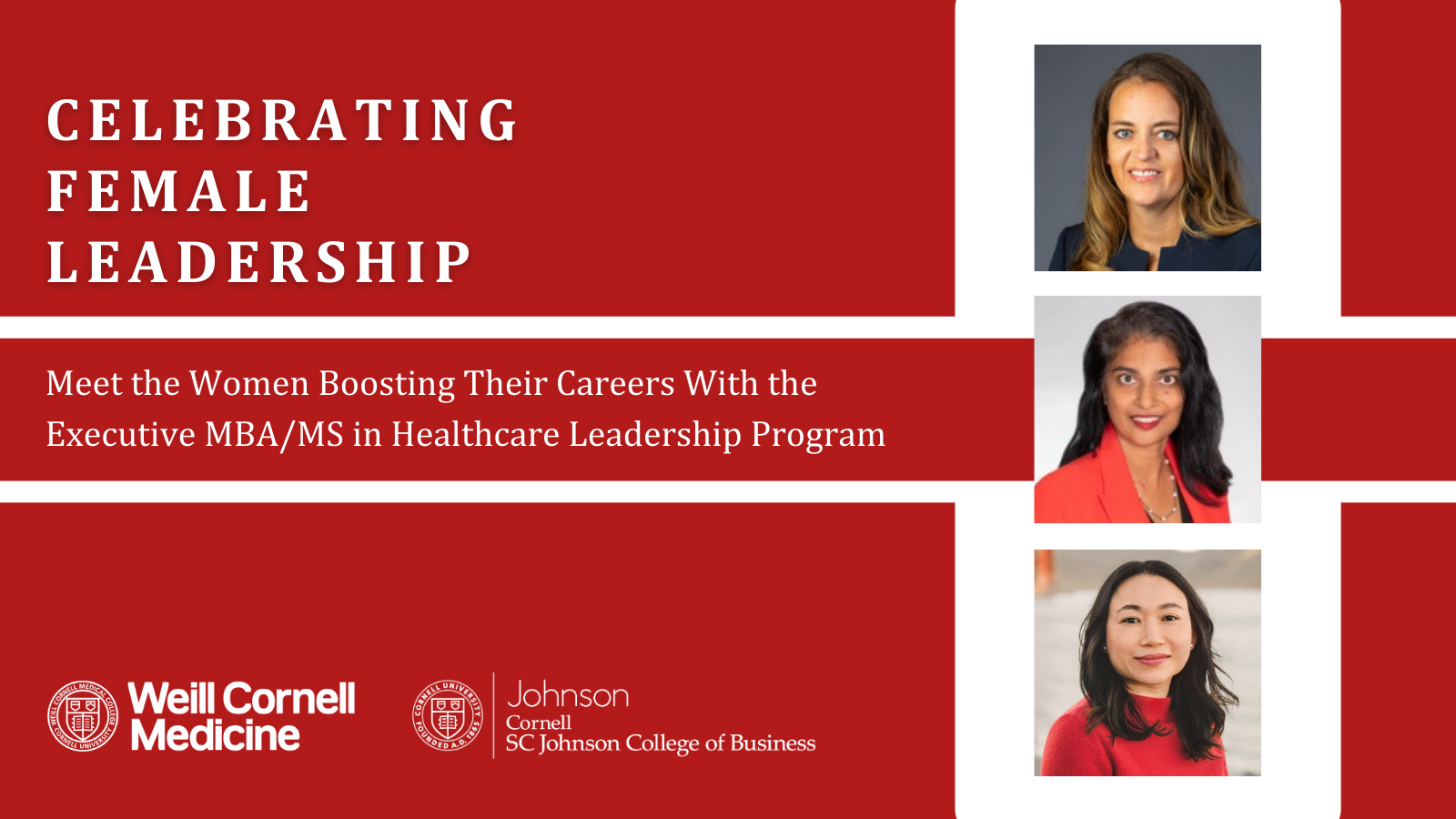
Historically, men have held a larger percentage of available leadership roles than women and have earned more than their female counterparts in these positions. According to Statista, there were only 36 female CEOs across American Fortune 500 companies in September of 2020 — just over 7% of the total positions. Cornell’s Executive MBA/MS in Healthcare Leadership program is dedicated to turning statistics like that around by striving for gender parity in each cohort.
Through EMBA programs, women acquire tangible business expertise and leadership skills necessary to help them break through the glass ceiling, as well as gain exposure to high-ranking professionals for future collaboration. While the national average of women in EMBA programs in 2020 was just 32.3%, 52% of Cornell’s EMBA/MS cohort was women. When accounting for all current students — the classes of 2021 and 2022 — 49% are women.
The program is co-chaired by Dr. Rainu Kaushal, Weill Cornell Medicine’s senior associate dean for clinical research and chair of the Department of Population Health Sciences, and Dr. Mark Nelson, the Anne and Elmer Lindseth Dean of the SC Johnson Graduate School of Management.
“We are on a mission to cultivate the next generation of healthcare leaders who will drive change in the industry at large,” Dr. Kaushal said. “Enrolling highly qualified women who bring diverse professional experience to the cohort helps our students understand different perspectives and widen their skillsets. We are dedicated to supporting women in the program and strengthening the female presence among leadership roles.”
As leaders of the EMBA/MS program continue to recruit the next cohort, current students and alumna are sharing what the program has meant to them as professionals, how they hope to close the gender gap in leadership positions, and how we can collectively continue to uplift women.
Dr. Pratibha Vemulapalli (’21), chair of surgery at The Brooklyn Hospital Center, has seen the number of women in leadership roles increase since her time in medical school and notes actions women can take to further improve gender equality across the professional landscape.
“First, we need to arm ourselves with knowledge through programs like this and then mentor and sponsor each other and create our own network. We have similar issues and struggles (imposter syndrome, microaggressions, etc.) and it is time we talk about it openly,” Dr. Vemulapalli said. “This program has been an extraordinary platform to connect with other women and discuss these issues. It has highlighted that there is no gender monopoly on great ideas.”
Many members of this new network have supported Dr. Vemulapalli, giving her advice and nominating her for opportunities. In turn, she has had the equally rewarding chance to mentor others. Dr. Vemulapalli also noted how the unique characteristics of the cohort have influenced her. “I have come to appreciate how diverse our group is. Diversity in cultural background, gender and even industry experience has been a hallmark of our cohort.”
There is still much work to be done before gender parity in healthcare is achieved, but Truc Phan Moyer (’22), a clinical trial leader at Genentech, is encouraged by the program’s focus on equality.
“Women belong in all places where decisions are being made,” Moyer said, quoting the late Supreme Court justice Ruth Bader Ginsburg. “I truly believe we will have gender equality within my lifetime, but reaching this goal means sustained efforts by leaders. After all, my mentors and the people I have been inspired by throughout my career and in this program are strong, intelligent women who are leading the way.”
One of the main benefits of the program for Moyer has been seeing challenges through a new lens. “We are connecting and learning from each other as much as we are learning from the courses. In a way, we are the weekend warriors who are collaborating to share our wealth of knowledge with each other to tackle real-life problems,” she said. “It’s such a unique opportunity to apply what I’m learning, in real-time, to work I am doing at Genentech.”
Jessa Davis (’20), director in technology consulting for health industries at PricewaterhouseCoopers, grappled with how a general MBA would fit in with her career trajectory. When she discovered Cornell’s EMBA/MS, “a lightbulb went off after several years of researching programs,” she said. Davis was excited about an entire cohort of professionals who had a unique focus on different aspects of the healthcare industry, including being able to learn with many women.
“Prioritizing gender parity is absolutely critical. Different points of view, approaches, experiences and backgrounds drive a more enriched and diverse conversation,” Davis said. “I recently met with a client that is selecting a long-term partner to work with and they are prioritizing diversity of the team as a selection criterion. This is a huge step because in my 20-plus years it has very rarely come up.”
Now an alumna, Davis is satisfied with how the program brought her together with her cohort. “I feel connected for life to a really awesome group of professionals that are all focused on healthcare.”
The Cornell Executive MBA/MS in Healthcare Leadership Program is a dual-degree program created by two powerhouses in graduate education—the Samuel Curtis Johnson Graduate School of Management and the Weill Cornell Graduate School of Medical Sciences— that focuses on building general management skills and developing a deeper understanding of the healthcare industry. Learn more about the program here.
- Highlights

